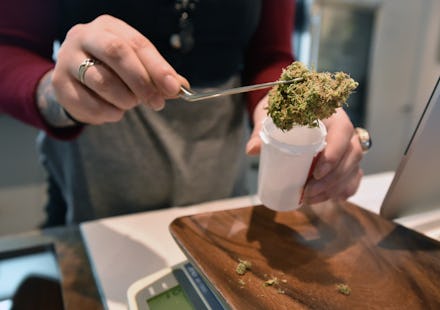Even Police Are Saying That Marijuana Is the Least of Their Drug Problems

An increasing number of police officers around the United States are now saying that fighting marijuana is their lowest drug-related priority, according to a survey released earlier this week that formed part of the 2015 National Drug Threat Assessment Summary, the Washington Post reported.
The U.S. Drug Enforcement Administration assessment asked a representative sample of 1,000 police officers around the country about what they saw as their biggest drug threats. All in all, in 2015, marijuana was the top choice of just 6% of officers and was dwarfed in significance by heroin (38%) and methamphetamine (33%). Prescription painkillers staked a middle spot with 15%, while cocaine edged out weed with 7%.
"Sadly, this report confirms what we've known for some time: Drug abuse is ending too many lives too soon and destroying families and communities," DEA Acting Administrator Chuck Rosenberg said in a press statement.
Rosenberg, however, must have been referring to all the other drugs in the assessment, as deaths from marijuana currently stand at virtually zero.
With data stretching back to 2007, a number of trends were evident in the survey's most recent numbers. First, marijuana has never been seen as the biggest threat from by law enforcement on the drug front. Even at its height, the data shows it was never selected by more than 15% of officers as a chief concern. Substantial variations, however, took place between the hard drugs. Cocaine, barely registering today, led the field from 2007 to 2010. As a concern, it was largely displaced by heroin, which, as the New York Times reported last month, is a growing scourge among middle-class whites.
The findings align with Vermont senator and Democratic presidential candidate Bernie Sanders' call to remove marijuana from the official federal list of dangerous drugs and leave the issues to the states. Earlier this week, Sanders introduced a bill in the Senate which would do just that. The survey also puts pressure on his chief rival, former Secretary of State Hillary Clinton, who has staked out a more cautious approach, declining to take a firm position during the first Democratic debate last month. "We need to do a lot more research," she said.
Officially, the DEA has remained adamant about the continuing dangers of legal weed, "If you want me to say that marijuana's not dangerous, I'm not going to say that, because I think it is," Rosenberg said during a July conference call, according to U.S. News and World Report.
He did, however, open the door to a nuanced distinction, which eluded his predecessors: "Do I think it's as dangerous as heroin? Probably not. I'm not an expert."
Catch up on the news that matters in 5 minutes or less by signing up for our daily email news briefing.